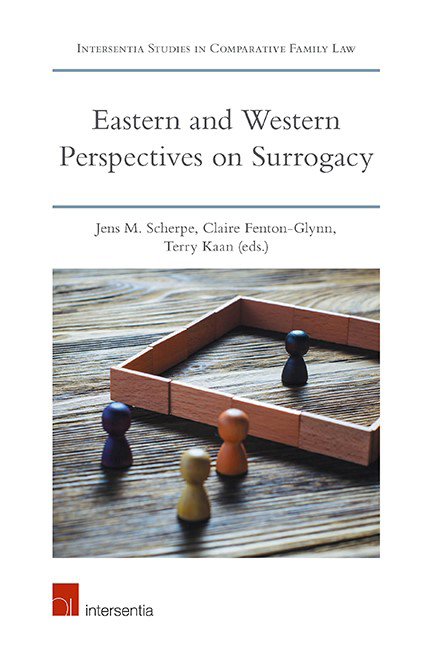Book contents
- Frontmatter
- Preface and Acknowledgements
- Contents
- List of Contributors
- Introduction
- Questionnaire
- PART I WESTERN PERSPECTIVES
- THE PROHIBITIVE APPROACH
- THE TOLERANT APPROACH
- THE REGULATORY APPROACH
- Greece
- Israel
- South Africa
- New Zealand
- Portugal
- Iceland
- THE FREE MARKET APPROACH
- THE INFLUENCE OF INTERNATIONAL COURTS
- PART II EASTERN PERSPECTIVES
- THE PROHIBITIVE APPROACH
- A TOLERANT APPROACH?
- REGULATION THROUGH PROFESSIONAL MEDICAL BODIES
- FROM FREE MARKET TO REGULATION
- PART III COMPARATIVE PERSPECTIVES ON SURROGACY
- Index
- About the Editors
Iceland
from THE REGULATORY APPROACH
Published online by Cambridge University Press: 26 June 2019
- Frontmatter
- Preface and Acknowledgements
- Contents
- List of Contributors
- Introduction
- Questionnaire
- PART I WESTERN PERSPECTIVES
- THE PROHIBITIVE APPROACH
- THE TOLERANT APPROACH
- THE REGULATORY APPROACH
- Greece
- Israel
- South Africa
- New Zealand
- Portugal
- Iceland
- THE FREE MARKET APPROACH
- THE INFLUENCE OF INTERNATIONAL COURTS
- PART II EASTERN PERSPECTIVES
- THE PROHIBITIVE APPROACH
- A TOLERANT APPROACH?
- REGULATION THROUGH PROFESSIONAL MEDICAL BODIES
- FROM FREE MARKET TO REGULATION
- PART III COMPARATIVE PERSPECTIVES ON SURROGACY
- Index
- About the Editors
Summary
GENERAL LEGAL FRAMEWORK
BAN ON SURROGACY IN ICELAND
Popular Icelandic folklore has numerous stories of women bearing children and giving them to others to raise, undoubtedly for different reasons and under various circumstances. The emergence and development of the science of human biology, reproduction and genetics has steadily increased the focus on how and to what extent reproductive technologies should be used to help persons desiring to create a family.
The use of artificial technologies in Iceland has been growing steadily for the last decades. Though a general legal framework was lacking, procedures using artificial insemination started in 1980 and in vitro fertilisation in 1991. The Act on Children from 1992 incorporated articles on paternity for children born through the use of artificial fertilisation. In 1996 Iceland passed the Act no. 55/1997 on Artificial Fertilisation and use of Human Gametes and Embryos for Stem-Cell Research. This Act sets out certain criteria for the use of different reproductive technologies, for example opened up the possibility of egg donation. The Act also marks the first formal discussion on whether or not to allow for the use of surrogacy in Iceland.
According to Art. 5 of the Act on Artificial Fertilisation, surrogacy is prohibited in Iceland. The Act defines surrogacy as ‘artificial fertilisation performed on a woman who intends to carry a child for another woman, and has agreed before the pregnancy to give up the child immediately after the birth.’ The preparatory comments on the issue of surrogacy were brief, first and foremost underlining that various ethical issues surround the question of allowing surrogacy. The preparatory comments specifically mention the issue of the maternity of the child, particularly after the use of egg donation, and emphasise the mater semper certa est (mater est) principle as the most widely acknowledged. The minority of the Parliamentary Standing Committee dealing with the Bill in 1995 issued a separate opinion agreeing with the majority on the ban on surrogacy while emphasising that surrogacy raised very many ethical and legal questions and particularly stated the view that commercial surrogacy was the worst form of female repression possible.
- Type
- Chapter
- Information
- Eastern and Western Perspectives on Surrogacy , pp. 259 - 278Publisher: IntersentiaPrint publication year: 2019



